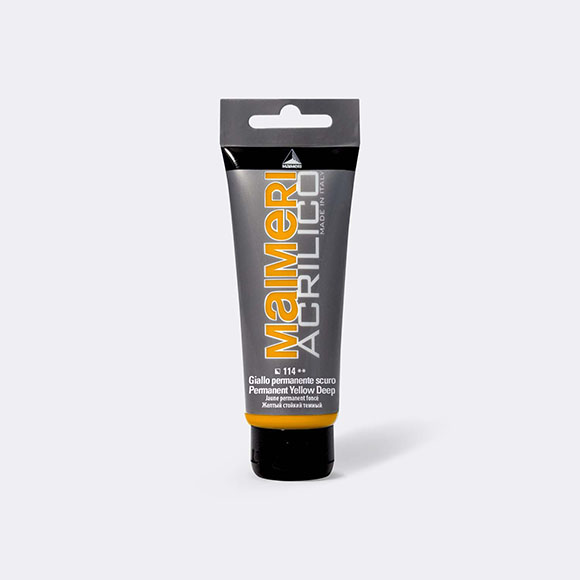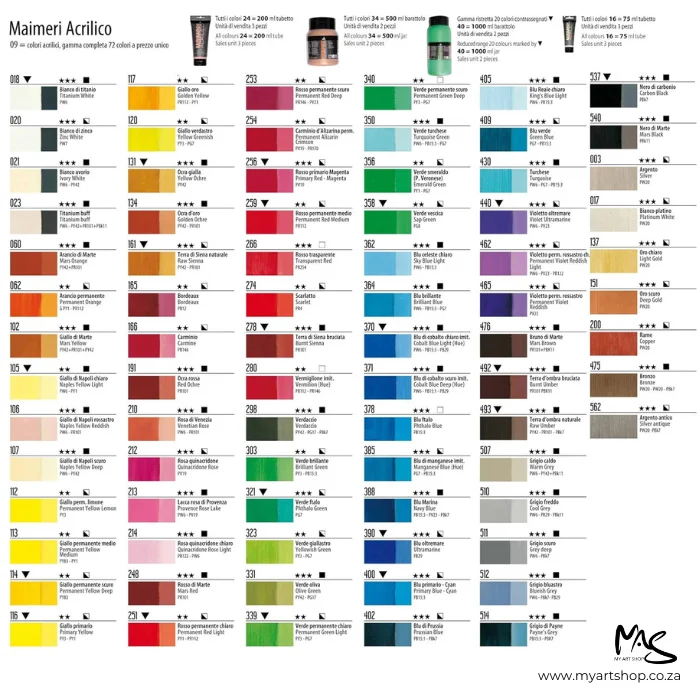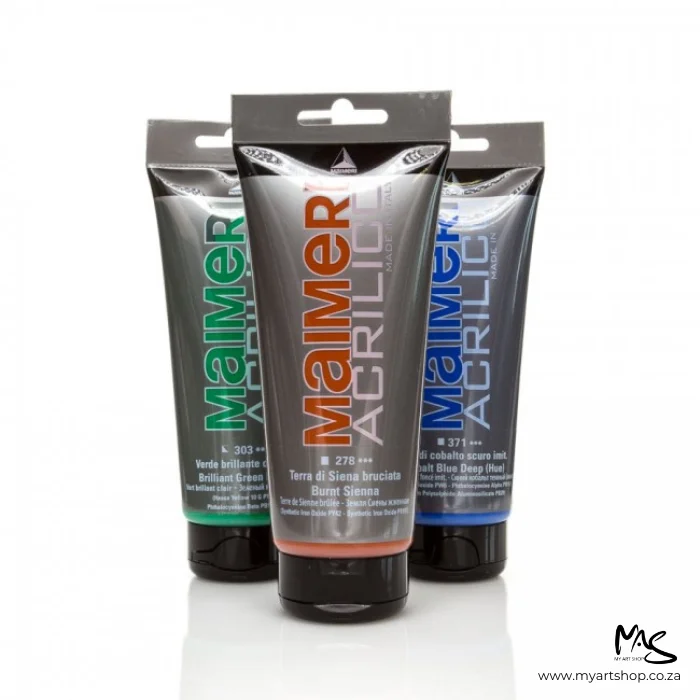Permanent Yellow Deep Maimeri Acrilico 75ml
- A new acrylic language, strong, fast and workable according to the nature and heart of the user.
- An excellent tool for professional artists and art students.
- Seventy-nine vibrant, bright, clean colours composed of good-quality pigments carefully ground, dispersed and stabilized, chosen for the purpose of getting deep, bright tones enhancing the brilliance and purity of the colour and conferring a luminosity never before achieved in a competitively priced acrylic colour range.
- The Maimeri Acrilico finish is uniform and semi-shiny.
- These paints, with their high concentration of resistant, elastic acrylic resin, spread uniformly even over unprimed supports.
- Maimeri Acrilico colours are dense and highly workable with a brush, making them very easy to use.
Original price was: R130.00.R105.00Current price is: R105.00.
Standard Shipping
- A new acrylic language, strong, fast and workable according to the nature and heart of the user.
- An excellent tool for professional artists and art students.
- Seventy-nine vibrant, bright, clean colours composed of good-quality pigments carefully ground, dispersed and stabilized, chosen for the purpose of getting deep, bright tones enhancing the brilliance and purity of the colour and conferring a luminosity never before achieved in a competitively priced acrylic colour range.
- The Maimeri Acrilico finish is uniform and semi-shiny.
- These paints, with their high concentration of resistant, elastic acrylic resin, spread uniformly even over unprimed supports.
- Maimeri Acrilico colours are dense and highly workable with a brush, making them very easy to use.
You may also like…
-
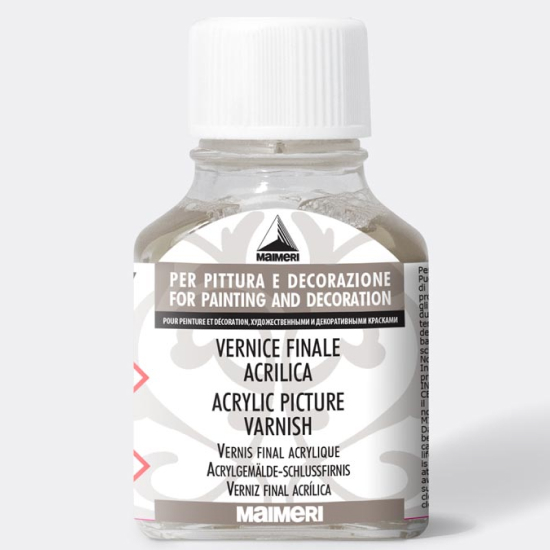
Maimeri Acrylic Picture Varnish
Standard Shipping
R255.00 -
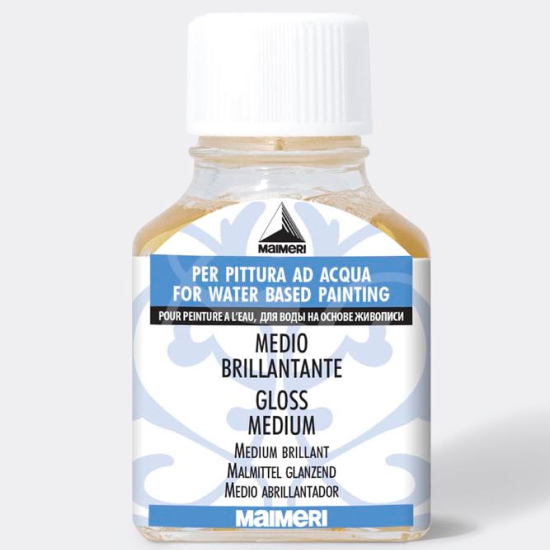
Maimeri Gloss Medium
Standard Shipping
R285.00 -
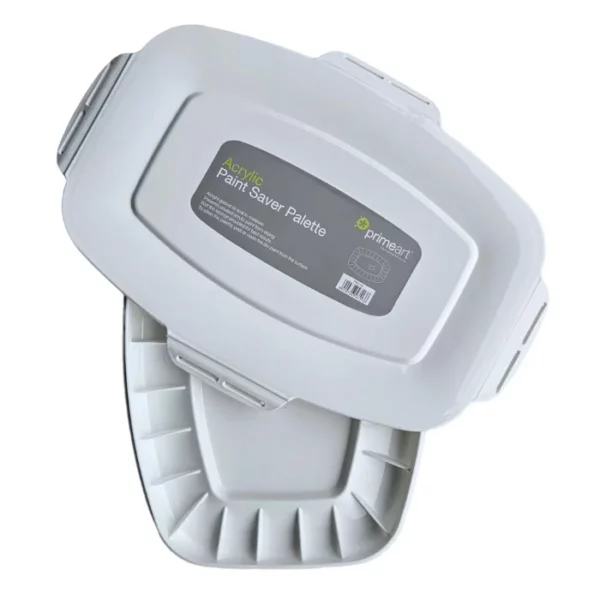
Prime Art Paint Saver Palette
Standard Shipping
R305.00 -
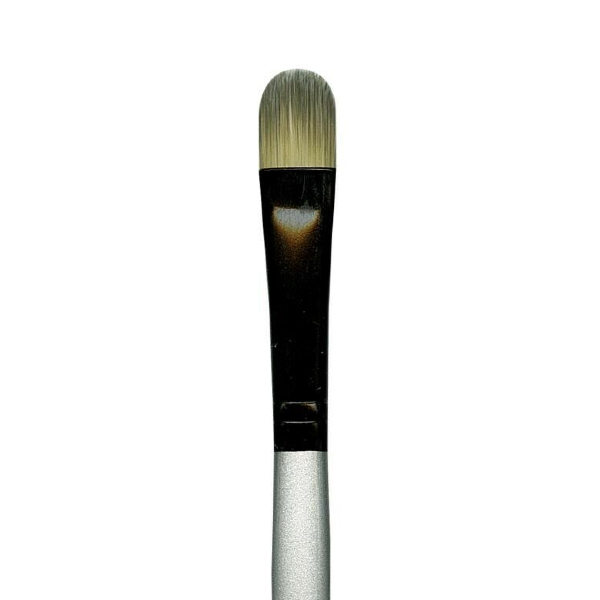
8 Filbert Dynasty Silver Black Series 4900
Standard Shipping
R70.00 -
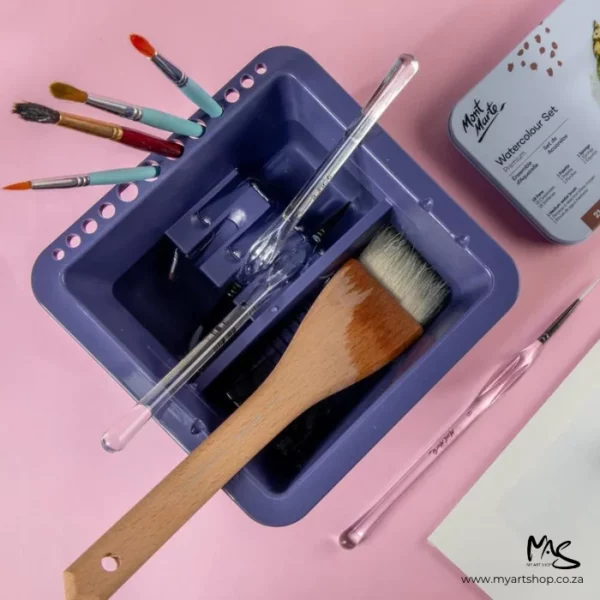
Mont Marte Signature Plastic Brush Washer
Standard Shipping
R80.00 Lock in the Loot
The Maimeri Acrilico line introduces a new acrylic language tailored to the needs of both professional artists and art students. Designed to be strong, fast, and adaptable, these acrylic paints offer a versatile tool for creative expression. Featuring 79 vibrant and clean colours, each hue is meticulously crafted from high-quality pigments, resulting in deep and bright tones that enhance the brilliance and purity of the colour. The uniform and semi-shiny finish adds a distinctive touch to artistic creations. What sets these paints apart is their unique formulation—carefully grounded, dispersed, and stabilized with a high concentration of resistant, elastic acrylic resin. This formulation ensures that the colours spread uniformly, even on unprimed surfaces, providing a level of workability that makes them exceptionally easy to use with a brush. Maimeri Acrilico colours promise a luminosity previously unseen in a competitively priced acrylic colour range, making them an excellent choice for artists seeking both quality and affordability.
Mixing Acrylic Colours
It is often said that you can create every color by mixing the three primary colors: red, yellow and blue in different ratios and combinations. What usually isn’t mentioned, however, is that undertones are something to keep in mind as well when mixing colours.
Primary & additional colours:
The primary colours – Primary Yellow, Primary Magenta and Primary Cyan tend to be a bit cooler, while the additional colours Azo Yellow Light, Naphthol Red Medium and Ultramarine create a warmer colour palette.
The cooler colours have blue undertones whereas the warmer colours have red and yellow undertones. Using a six-colour mixing system allows you to create colours in any colour temperature, giving you more options than with a three-colour mixing system.
Selecting the right colours:
To create bright, pure colours, select colours with undertones that don’t “pollute” your desired colour. For example, if you want to create a nice, bright violet, you should opt for Magenta and Cyan as they both have blue undertones.
If you were to mix Naphthol Red Medium with Ultramarine, you would still get a purple colour, but since the red has a yellow undertone to create a warmer colour, the purple will turn out a bit more yellow as well. This makes the colour duller and not as vibrant as it could have been using colours with blue undertones.
Using just the primary colours, you would not be able to easily create a bright orange, for example, since Magenta has blue undertones. Using the additional mixing colour Naphthol Red Medium and Azo Yellow Light, you can create a beautiful warm orange.
When mixing a cool-toned yellow with a cool-toned blue, the green that would come out is a bright, vibrant green. With the warm-toned colours, greens tend to lean more towards earthy brown or olive colours.
Acrylic FAQ’s
What are the benefits of Acrylic Paint?
Acrylic paint dries quickly, is very flexible and waterproof once dry. The paints are water-based, so there’s no odour and you can easily clean your hands and painting tools using just soap and water, no need for turpentine or white spirit.
They’re also incredibly versatile since they adhere to virtually any surface. Acrylic paints become even more versatile in combination with acrylic mediums. There are various mediums to adjust the characteristics of your paint to your liking, whether you want to thicken or thin your paint, add special effects or give your work an extra glossy or matt finish, anything’s possible with acrylic paint!
What do I need to start Acrylic Painting?
A nice selection of acrylic paint colours.
A selection of brushes in different sizes. The best ones to start with are a few round brushes, and a few flat brushes. Two of each should be enough. Get them in small and large sizes so you have some variety to choose from. You can also add a fine detail brush if you plan to create a detailed painting or a large paddle brush if you want to work on big surfaces.
A painting knife can be a great help when mixing colours since you can easily wipe off the paint, brushes can become too clogged with paint if you use them for mixing.
A cup of water to rinse your brushes with between colours.
A palette to mix your colours on.
And last but not least, the surface you’ll be painting on. This can be a canvas, paper, a wall or a household object, as long as it’s slightly absorbent and free of dust and grease, you’re most likely good to go!
Tip: thin your paint using an acrylic medium instead of water from the start! This helps you spread your paint more easily and evenly, so you can work with the same amount of paint for longer.
How long dies it take for Acrylic Paint to dry?
The drying time of acrylic paint depends on various factors, including humidity, temperature and the thickness of your layers, but it’s usually dry to the touch in about 30 to 60 minutes. Most paints will fully cure in 3 to 4 days, but you can add layers once the paint is dry to the touch. Varnish can be applied after a minimum of 4 days.
Can you delay the drying time of Acrylic Paint?
If you want to work ‘Alla Prima’, also known as direct painting or wet-on-wet, using acrylic colours, you need to act quickly as acrylic paint dries quite fast. Buy yourself some extra time to create stunning colour transitions, blend colours smoothly and allow yourself to work on the same area for longer by using a slow drying medium or acrylic retarder.
Why do Acrylic Colours appear darker when they dry?
The binder of both acrylic paint and mediums is a dispersion of acrylic resin particles in water. As long as the binder contains water, the binder appears white in colour. As the paint dries, the water evaporates and the acrylic resin particles form a uniform, colourless, transparent film. That white cast you see while the colour is wet has disappeared completely and the true colour of the pigments is now visible. This effect, often called colour shift, explains why acrylic paints become darker when they dry. The same counts for acrylic mediums. When you mix a colour with a medium, the wet paint will appear slightly lighter than on its own. After drying, the colour will be the same as the pure, dried paint.
Why does the brush stroke partially disappear once the paint is dry?
Since the binder of acrylic paint consists of acrylic resin particles and water, the paint layer will lose volume when the water evaporates from the paint. This means your brush strokes may become much more subdued once your paint has dried compared to when you first applied it. There are mediums to counter this.
Can Acrylic paint be used on top of oil paint?
Since oil paint creates an oily film, it is not a suitable base for acrylic paint. Acrylic paint needs a slightly absorbent surface that is free of dust and grease to adhere to.
Maimeri Mediums and Solvents:
Maimeri Acrylic Picture Varnish
Maimeri Gloss Medium
Maimeri Matt Medium
Maimeri Matt Water-Based Picture Varnish
Maimeri Water-Based Picture Varnish
Maimeri Acrylic Modeling Paste
Maimeri Fine Acrylic Pumice Medium
Maimeri Gloss Gel Medium
Maimeri Gloss Heavy Gel Medium
Maimeri Matt Gel Medium
Maimeri Matt Heavy Gel Medium
High quality art supplies at the lowest prices!


